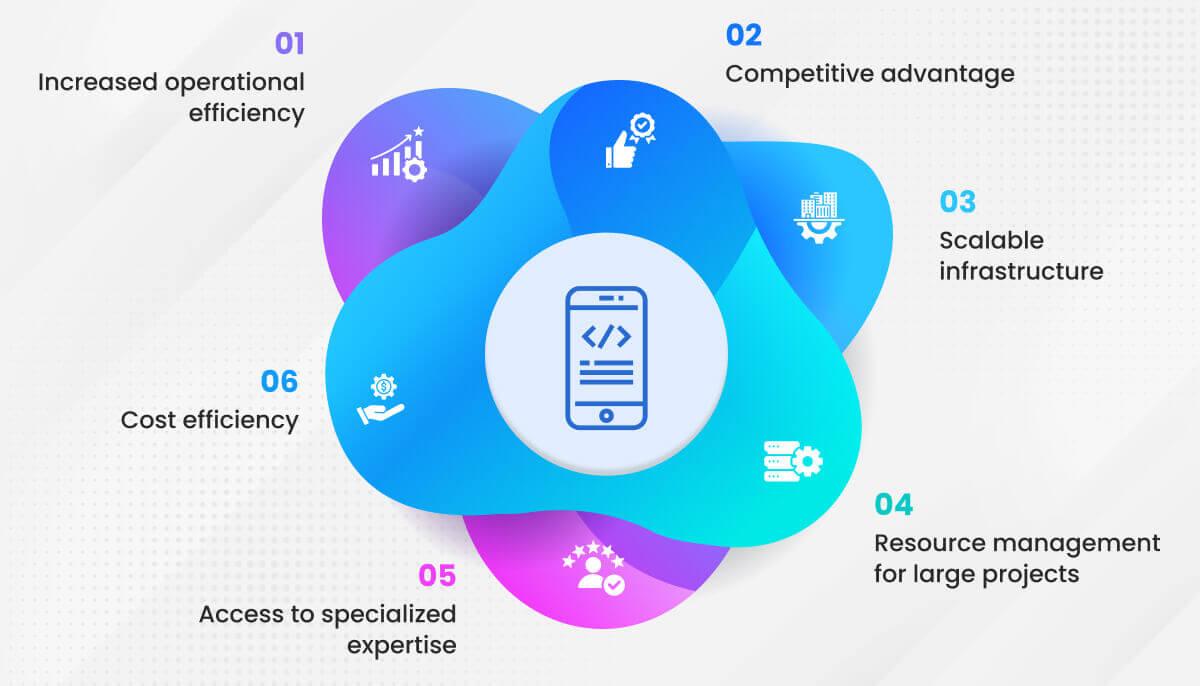The mobile app development market has experienced massive growth since the advent of smartphones and tablets. As of April 2024, there are 4.88 billion smartphone users worldwide, which is 60.42% of the world’s population.
The growth of mobile device usage has created a high need for businesses and organizations to utilize the power of mobile technology to remain connected with their customers and improve their operations. Enterprises prefer custom mobile app development to build software solutions that cater to their business goals and satiate their industry needs.
And here, hiring mobile app developers can be a great help for businesses. Why? These developers are highly skilled and can help businesses to develop an app that resonates with their brand identity, thus helping them to connect with their customers more.
According to Statista, the application outsourcing market is projected to reach $121.60 billion in revenue in 2024, and $129.90 billion by 2028. This showcases the importance of hiring mobile app developers for your businesses to stay up to date amongst competitors.
But when should you consider hiring mobile app developers for your business?
Let us talk about some of the key use cases where hiring mobile app developers brings great advantages to your ventures.
Top use cases for when businesses should hire mobile app developers
Here are some top use cases when businesses should seek to hire mobile app programmers and developers to create their business applications:

Increased operational efficiency
Clutch’s survey revealed that 42% of small businesses have devised a mobile app to enhance their productivity levels.
Mobile apps simplify the routine operations of workers by giving them the ability to have access to information, tools, and resources in an instant. Such a factor can help to cut down on the administrative workload, to make better decisions, and to increase productivity.
Take, for instance, a field service app that allows engineers to attain repair manuals, submit job reports, and manage schedules directly from mobile devices. This is likely to result in faster responses, less paperwork, and more streamlined service provision.
By automating some tasks and improving communication, hiring an offshore mobile app developer can help reduce administrative expenses of different business operations, thus providing you with more available time to prioritize important activities.
Competitive advantage
In a lot of industries, having a great mobile presence has become one of the basic factors for businesses to remain competitive. A customized mobile app can make a business stand out among competitors and add peerless value to its customers.
Projection by data.ai reveals a figure of 58 trillion hours spent collectively on mobile in a decade (2021- 2030) which is around 16 billion hours per day.
It’s a very big number and this explains how companies need to create unique apps and offer personalized services to reach their customers. Therefore, hiring a remote mobile app developer might be the answer as well. Through mobile apps, a business can provide features and functionalities that are not available on a competitor’s website or any other channel, which provides an advantage over competitors.
Hiring mobile developers to create applications also helps a company enhance its branding, interact with customers on a more personal level, and create a better, more engaging environment for its customers that places it on top of the competitors.
Scalable infrastructure
Creating and sustaining a mobile app is a time-consuming and resource-heavy process with the number of users increasing and new capabilities added. Hiring offshore mobile app developers will be the main driver that helps businesses create a scalable and flexible infrastructure supporting the app on a mobile device, which allows managing hosting, server resources, and software updates. This way, the cost of establishing the infrastructure and running it with overheads won’t be an issue for businesses when they hire mobile app developers offshore.
Resource management for large projects
Coming up with bespoke mobile applications which are especially for enterprise-level organizations is a big and complex task that involves a lot of preparation, arrangement, and planning of resources.
When a business decides to outsource mobile app developers with domain-specific expertise, it is expected to help them achieve task objectives more efficiently and effectively, among other things related to project management. These developers have insights into the different stages of the application development lifecycle, including design, implementation, and after-deployment.
With the experience of mobile app developers, companies can ensure that the project adheres to the schedule, the budget, and the goals and objectives of the project. This can be handy not only for organizations that have no in-house mobile development capabilities but also for companies that need to support their existing team.
Access to specialized expertise
Developing mobile applications is a skill that requires knowledge of different mobile platforms (e.g., iOS, Android), programming languages (e.g., Swift, Java, Kotlin), UI/UX design, and testing frameworks. Mobile app developers for hire bring businesses access to niche skills, which can be otherwise challenging and time-consuming for a small organization to grow from onshore.
Mobile app development companies offshore have skilled professionals with knowledge of the most current mobile technologies, frameworks, and methodologies. This can help companies take advantage of the most transformative solutions and guarantee that the mobile app is built to the highest standards.
Cost efficiency
Overheads
Hiring mobile app developers often turns out to be more cost-effective than assembling an in-house mobile development team, particularly for small and medium-sized enterprises.
Mobile app companies can take advantage of the opportunity to leverage economies of scale and share resources like development tools, testing infrastructure, and project management expertise across various types of mobile app development. This approach can result in a decrease in the overall costs of mobile app development services for enterprises.
Companies may opt for outsourcing developers which are cheaper alternatives. Thus, they can avoid the overhead of employing, training, and keeping in-house mobile programmers. Organizations that do not need constant mobile app development can avoid ongoing maintenance by outsourcing mobile app developers for hire.
Support & maintenance
Mobile apps need frequent updates to fix various bugs, security issues, and new platform features. Hiring remote mobile app programmers will make it possible to have a functional app that is regularly updated and refined to deliver the best possible experience to users. These developers can identify and fix problems fast, and implement new features and functionalities to make the app up to date all at affordable prices.
To remain engaging and not fall out of date, regular updates and fixes will be necessary to ensure safety and users will also use the app regularly. Delegating this job to the mobile app development teams will give internal resources credit-free and sustain the app over the long term.
Conclusion
The mobile app development landscape keeps changing fast, especially under the influence of the proliferation of smartphones and tablets across the globe. To keep companies competitive and connected with their customers, having a skilled mobile app developer has become essential.
The use cases mentioned above show the multifaceted impact mobile apps have on companies of all types and in all industries. You can hire mobile app developers offshore to save money, acquire global talent, and finally ensure long-term maintenance and support for your mobile apps.
Social Hashtags
#MobileAppDevelopment #HireDevelopers #HireAppDevelopers #OffshoreMobileAppDevelopment #HireMobileAppDeveloper #AppDevelopment #RemoteAppDevelopers #AppDeveloperforHire #AppDevelopmentUseCases #OutsourceAppDevelopment #OffshoreDevelopers #RemoteHiring
Testimonials: Hear It Straight From Our Customers
Our development processes delivers dynamic solutions to tackle business challenges, optimize costs, and drive digital transformation. Expert-backed solutions enhance client retention and online presence, with proven success stories highlighting real-world problem-solving through innovative applications. Our esteemed clients just experienced it.












